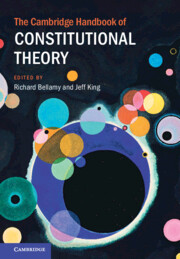Book contents
- The Cambridge Handbook of Constitutional Theory
- The Cambridge Handbook of Constitutional Theory
- Copyright page
- Contents
- Figures
- Contributors
- Frontispiece
- Preface and Acknowledgements
- 1 Introduction
- Part I Values
- 2 Human Dignity
- 3 Rights
- 4 Equality
- 5 Liberty
- 6 Well-Being
- 7 Self-Government
- 8 Justice
- 9 Recognition
- Part II Modalities
- Part III Institutions
- Part IV Challenges for Constitutional Democracy
- Bibliography
- Index
- References
3 - Rights
from Part I - Values
Published online by Cambridge University Press: 27 March 2025
- The Cambridge Handbook of Constitutional Theory
- The Cambridge Handbook of Constitutional Theory
- Copyright page
- Contents
- Figures
- Contributors
- Frontispiece
- Preface and Acknowledgements
- 1 Introduction
- Part I Values
- 2 Human Dignity
- 3 Rights
- 4 Equality
- 5 Liberty
- 6 Well-Being
- 7 Self-Government
- 8 Justice
- 9 Recognition
- Part II Modalities
- Part III Institutions
- Part IV Challenges for Constitutional Democracy
- Bibliography
- Index
- References
Summary
This chapter attempts two tasks, conceptual and normative. First, I argue that constitutions need not include rights as a matter of logic: it is possible for a set of laws and conventions to qualify as a genuine constitution of a state or legal system, even if they do not contain any rights – or almost none. Nonetheless, secondly, I argue that rights-free constitutions miss out on something valuable: it is hard to see non-rights constitutions as intended to serve citizens qua individuals. In particular, I argue that there are strong reasons in favour of constitutional rights on both natural rights and democratic grounds. I end by explaining the way in which rights function as limits on government power: we will see that they need not be the limits that constitutionalists endorse.
- Type
- Chapter
- Information
- The Cambridge Handbook of Constitutional Theory , pp. 38 - 55Publisher: Cambridge University PressPrint publication year: 2025

